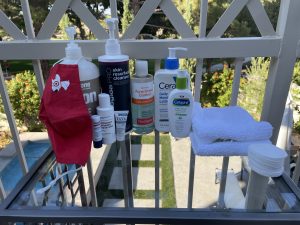By Oliver Van Aken

As we entered the Covid-19 pandemic approximately one and a half years ago, no one thought of teenage acne breakouts as a possible side effect that would be popped on society. Yet, due to additional stressors such as selective quarantining and the consequences of the disease itself combined with the heavy and consistent usage of facial masks, it is more important now than ever to know how to take care of your skin.
“Before Covid my skin didn’t have like any pimples and was pretty clear,” senior Alex Willingham said. “But because of having to wear the mask all the time I have noticed an increased amount.”
Skincare can sound intimidating with hundreds of brands pushing their lotions, serums, and scrubs; however, upon a closer look, there are only a couple basic products that are needed to start cleaning up your skin.
Facial Cleanser
A beginning step of any proper skincare routine is a facial cleanser or face wash, which is not the same as a body wash. Unlike body wash, facial cleansers are designed to support and balance the face’s delicate and sensitive skin while efficiently cleaning the surface of any dirt or bacteria. Examples of facial cleansers that can be found and bought at most local retail stores are the Cerave Hydrating Facial Cleanser and the Neutrogena Fresh Foaming Cleanser, which are both available at inexpensive prices. Washing the face should take precedence and be done either in the shower or sink-side. To ensure the best outcome, be sure to exfoliate all corners of the face thoroughly with the cleanser, then rinse it off in cold water.
Facial Toner
A facial toner is an often forgotten ingredient in most skincare routines, yet can be proven to be one of the most important aspects. Toner acts as a sanitizer for your face, killing any bacteria among dormant or inflamed pores, which means it may sting a little similar to rubbing alcohol on a cut. For men, shaving after the face is washed but before applying a facial toner is ideal. Reliable facial toners can be found next to facial cleansers at local retail stores, with Neutrogena even offering their Oil-Free Toner. To apply properly, apply a toner to a cotton pad and reach all parts of the face, making sure recently popped acne or open cuts are treated. Once complete let the toner dry naturally upon the face.
Facial Moisturizer
A facial moisturizer is the piece de resistance of any decent skincare routine. Moisturizer is applied after other products, which allows it to calm and rehydrate the skin after the tolling cleanser and toner applications. Facial moisturizer makes the skin softer and gives it a more shiny and clean appearance. Some moisturizers even incorporate sunscreen, a necessity to fight off redness and potential damage, into their ingredients. Moisturizers such as Cetaphil’s Daily Facial Moisturizer SPF 15 and Cerave Daily Moisturizing Lotion are popular options that can be found at any local retail store. To apply facial moisturizer, dot sections of the face with the lotion then disperse them, ensuring all of the face is covered. Similar to toner, a facial moisturizer will also dry naturally upon the face.
After creating a basic skincare routine with these three categories the face will both seem and feel cleaner, which often raises one’s confidence and self-image. Although, there are other aspects that contribute to acne and skincare, an important factor being diet. As our modern-day American diet consists of more processed and sugary foods, we see an incline in acne among teens and adults. It’s been proven that food groups such as dairy and sugar directly correlate to acne contribution, making it easy to accumulate under Americans’ habitual eating of milkshakes, ice cream, and candy. An efficient non-acne prone diet should consist of natural ingredient foods, fruits and vegetables, and limited dairy/sugar intake.
“My dieting has always been poor, but I didn’t think that could contribute to the condition of my skin,” senior Trevor Nellis said. “After learning this I’m going to take more effort in making sure I avoid bad foods; I didn’t know I could help myself like that.”
Taking measures such as at-home skincare steps or proper dieting can lead to significant progress with acne; however, in some cases due to genetics or hormones, little to no progress could be shown. At that point, it may be worth your time to visit a dermatologist who will work with a patient to craft an individualized skincare routine with topical creams or pills that can only be administered by a medical professional.
Ultimately, it is true that the number of teens with acne has increased due to the constant wearing of masks during the pandemic, but that does not mean acne is unnatural. Acne is a biological response to inflammation in the facial pores and everybody has had acne at one point over the course of their life. It’s important not to fall into a depression or a point of low-self esteem brought by the embarrassment or insecurities of acne, as most cases dry up by the mid-twenties.











